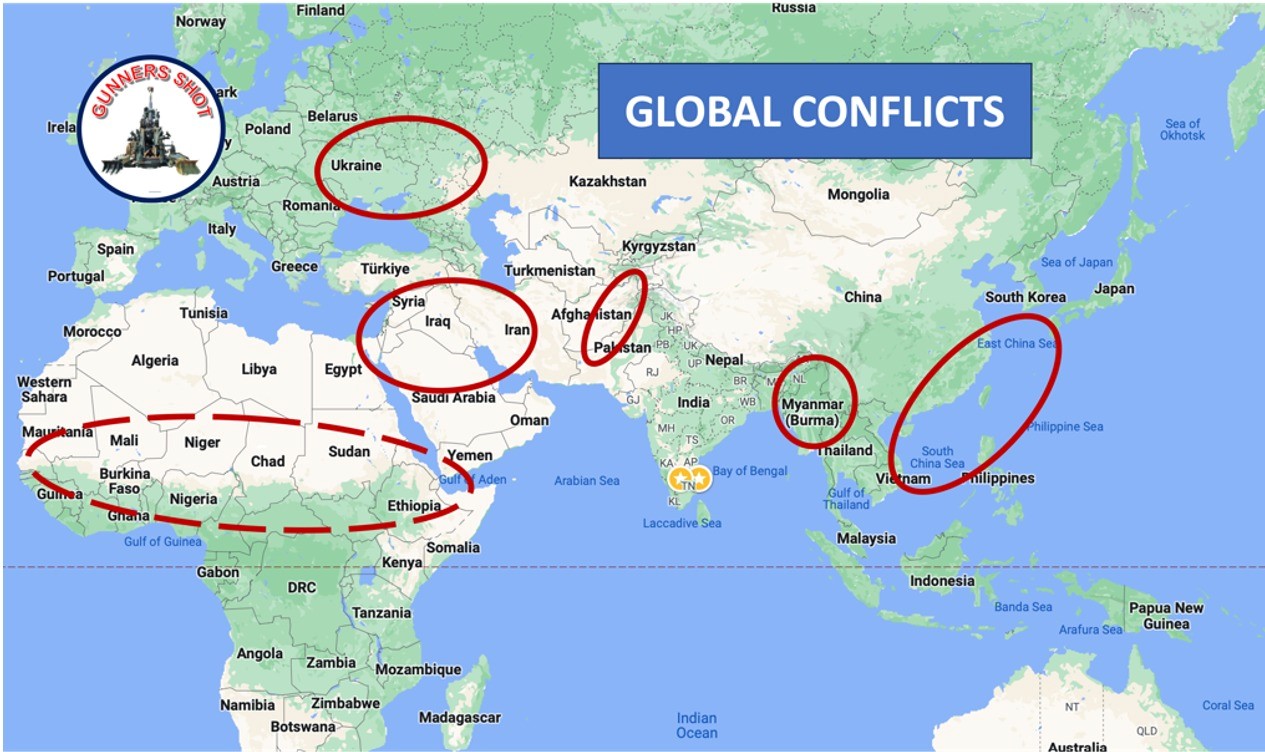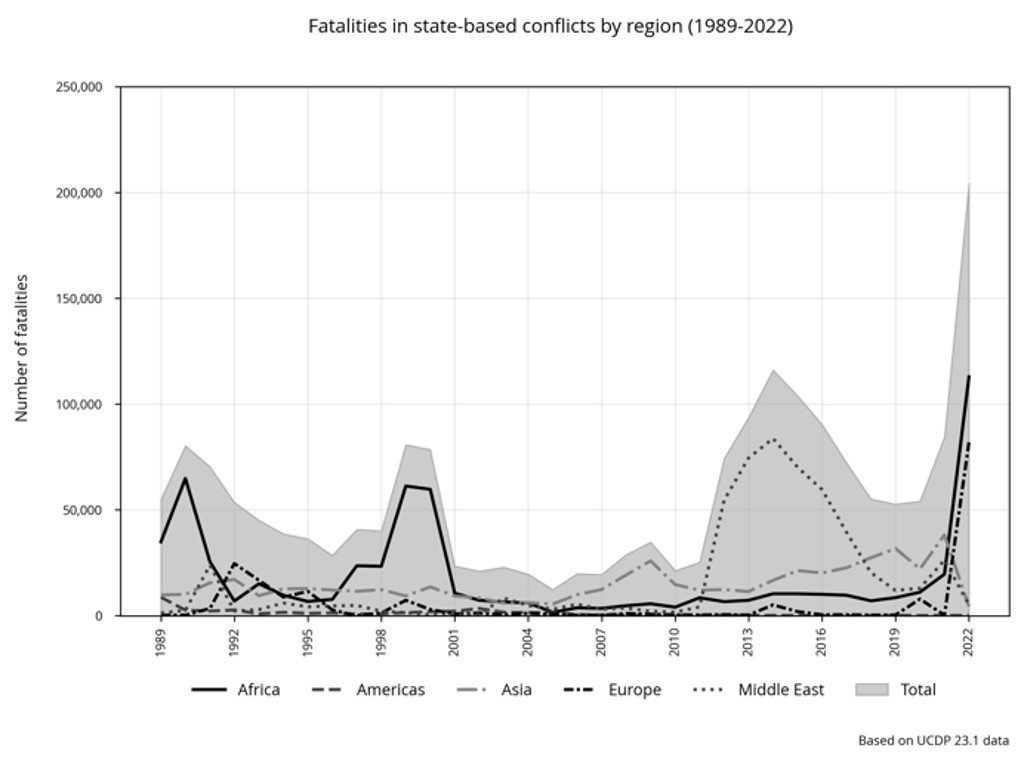Regular wars between states have returned with a vengeance. Chief among them are the wars between Ukraine and Russia, Armenia and Azerbaijan, and Israel and Palestine/Hamas.
In addition, Africa's Sahel region has seen civil wars, coups and ethnic conflicts. A debilitating civil war is raging in Myanmar. Pakistan is fighting with TTP (Taliban) on its western border.
Under the shadow of US-China military tensions, the western Pacific region has seen conflicts between China on one side and Taiwan, the Philippines, South Korea and Japan on the other.
Overall, more deaths occurred in 2023 than at any other time this century. The diagram below is self-explanatory in this regard. I believe this number will rise in 2024.
On top of these conflict situations, people around the world are struggling to cope with impending disasters that do not respect borders or nationalities. These include climate change, food insecurity, epidemics/infectious diseases, terrorism, energy shortages and inflation.
There do not seem to be any definitive solutions to man-made or natural problems. The world order is clearly in disarray. Long-term global instability looms on the horizon. The great powers who were to set up this order were the first to challenge each other in these conflicts and turmoil.
Furthermore, they are notable for their absence or relegation to meaningful climate change negotiations. This is particularly important as it leads to global warming and must contribute if any mitigation is to occur.
In this context, it is unlikely that the middle powers will step up, set the agenda and push world powers into the New World Order. This new paradigm needs to be understood.
Global order manifests itself in two ways. First, through the direct influence of a great power's military, technological, diplomatic, and economic strength, it dominates discourse and shapes the behavior of others.
The other is through the administrative mechanisms of international institutions, either directly or through a series of treaties drawn up between them over time, established by the old superpowers.
Through these instruments of power, they have shaped a world order to fit their vision. China's emergence as a significant power and its willingness to set up its own institutions to establish a Sinocentric world order is challenging the existing US-led paradigm.
As a result, the world inevitably turns into two camps. One consists of the United States and its traditional allies, mostly liberal democracies (also known as the West). On the other side are China, Russia, North Korea and Iran.
There is fierce competition between the great powers and their camps to shape the emerging world order according to their visions.
The middle powers of the world and the global south do not want to participate in this competition. Instead of getting caught up in big power politics, they are more interested in protecting their people and fighting the elements and day-to-day vagaries.
The reality is that the Global South does not have the power to influence the world order. However, middle powers are required to change the behavior of major powers and meet the needs of the Global South.
Middle powers emerge as voices of reason that can contribute to stabilizing world order. However, one needs to understand what a middle power brings to the table.
Middle powers of consequence may or may not be aligned with any of the emerging groups but have reasonably deep engagements with all global powers. Invariably, they have enough influence in the international power structure to shape international events.
A middle power may derive its status based on its key technologies, resources, military and economic strength, diplomatic capabilities, population strength, geo-strategic location or leadership skills/track record/credentials.
The Central Powers relied heavily on trade and diplomacy. They mostly follow a multilateral foreign policy and avoid unilateralism. Central powers are stable and generally not revisionist or transformative.
Central Powers are also essential cow to create and maintain world order. They facilitate organizational participation and the functioning of international organizations. They bring stability to the world order.
No global power can create or sustain international institutions without the steady influence and support of middle powers that support such institutions. Their neutral approach is crucial every time.
Middle powers can be fully formed with large economies like UK, France, Germany and Japan. Because of their influence in global affairs, developed countries with strong economies such as Australia, Canada, the Netherlands, Poland and South Korea also fall into the middle jurisdiction.
Oil economies such as Nigeria, Saudi Arabia and Iran also fall into the middle power category. Large developing countries such as Brazil, India, Indonesia, South Africa, Turkey and Vietnam naturally fall into the middle power category.
Relatively small states such as Singapore, Qatar and the United Arab Emirates can move into the middle power category because of their strong economies and their role as international intermediaries.
Most middle powers have historical, cultural, religious, ethnic, economic, security and demographic ties/similarities with smaller countries from the Global South on their periphery.
Countries like India have very wide and deep connections with countries to its east and west. Over time, the middle powers developed their constituencies and spheres of influence. The diaspora of middle powers plays an essential role in building their influence.
Instead, many countries in the Global South look to middle powers for issues that are important to them because they cannot attract the attention of world powers. Central powers also provide confidence in international affairs. It is completely free from the pantheon of global powers.
Consequently, global powers need a sphere of influence of middle powers to connect with the global South. Global powers also need some middle powers for their economic and technological strength.
In this context, actions by central powers to protect their constituencies are a feature of the international system. Many of them, India, Saudi Arabia, Indonesia, Malaysia and others, have confirmed that they are not seen as part of one global bloc or the other.
They have embraced multilateralism without reservation. Middle powers are championing the cause of the Global South, as India did to allow African countries into the G20.
Many middle powers seek to play mediator in conflicts and wars. An example is Turkey's role in facilitating peace talks between Russia and Ukraine. Even in the ongoing Israel-Hamas war, the demand for India to mediate peace is amply expressed.
Powers like South Korea play an important role in regional and conflict situations. Malaysia, Vietnam and Indonesia can also be seen balancing the Indo-Pacific between China and the US.
By doing so, the Middle Powers were able to control and control the world powers from overconfidence. For example, Japan, South Korea, the Philippines, and Vietnam have taken individually defensive measures to impose joint warnings of an assertive China in the South and East China Seas, particularly around Taiwan.
In this process, middle powers also play a balancing role while protecting their challenges. They don't want to be caught between global powers in their competition.
A major issue is that global superpowers are declining or facing their own problems at home and abroad. Both the US and China have domestic problems that weaken their external postures.
World powers don't have the guts to impose themselves like they used to. They have their vulnerabilities, which cannot be filled on paper. Notably, global powers are also vulnerable to significant humanitarian challenges on the horizon such as climate change, global warming and pandemics.
For many of these natural threats, there are no answers that global powers can provide without middle powers. This was amply demonstrated during the pandemic when India played a major role in its eradication against China, which was plagued by the virus with no response.
Another important aspect is that the middle powers are relatively advanced economically and technologically. The gap between world and middle powers has narrowed. Hence, the influence of such middle powers in international affairs has increased.
The emerging world order will continue to be dominated by global powers as hitherto. However, in the future, many agendas will be set by middle powers who will gain prominence and exert their influence more decisively.
This is evident in emerging multinational corporations. Thus, it is possible for a nation to be multilateral in many institutions and to create systems that do not give world powers a license to operate freely.
World powers are forced to take others. India has already proven this, and its role in the recently concluded SCO, BRICS and G20 summits has stonewalled China's China-centric ambitions.
Global powers must recognize the importance of central powers and the relevance of the global South in all declarations emanating from these meetings. This situation is unlikely to change.
Conversely, when some middle powers rise to global proportions, the effect is even greater, and the role of middle powers in setting global agendas expands. India is at the forefront of this change. We have no doubt about it.
Image source: Academic dictionaries and encyclopedias
Disclaimer: The views expressed in this article are the personal views of the author. MyIndMakers is not responsible for the accuracy, completeness, relevance or validity of any information contained in this article. All information is provided on an as-is basis. The information, facts or opinions appearing in the article do not reflect the views of MyindMakers and it assumes no liability or responsibility.

. „Gracz. Namiętny pionier w mediach społecznościowych. Wielokrotnie nagradzany miłośnik muzyki. Rozrabiacz”.


